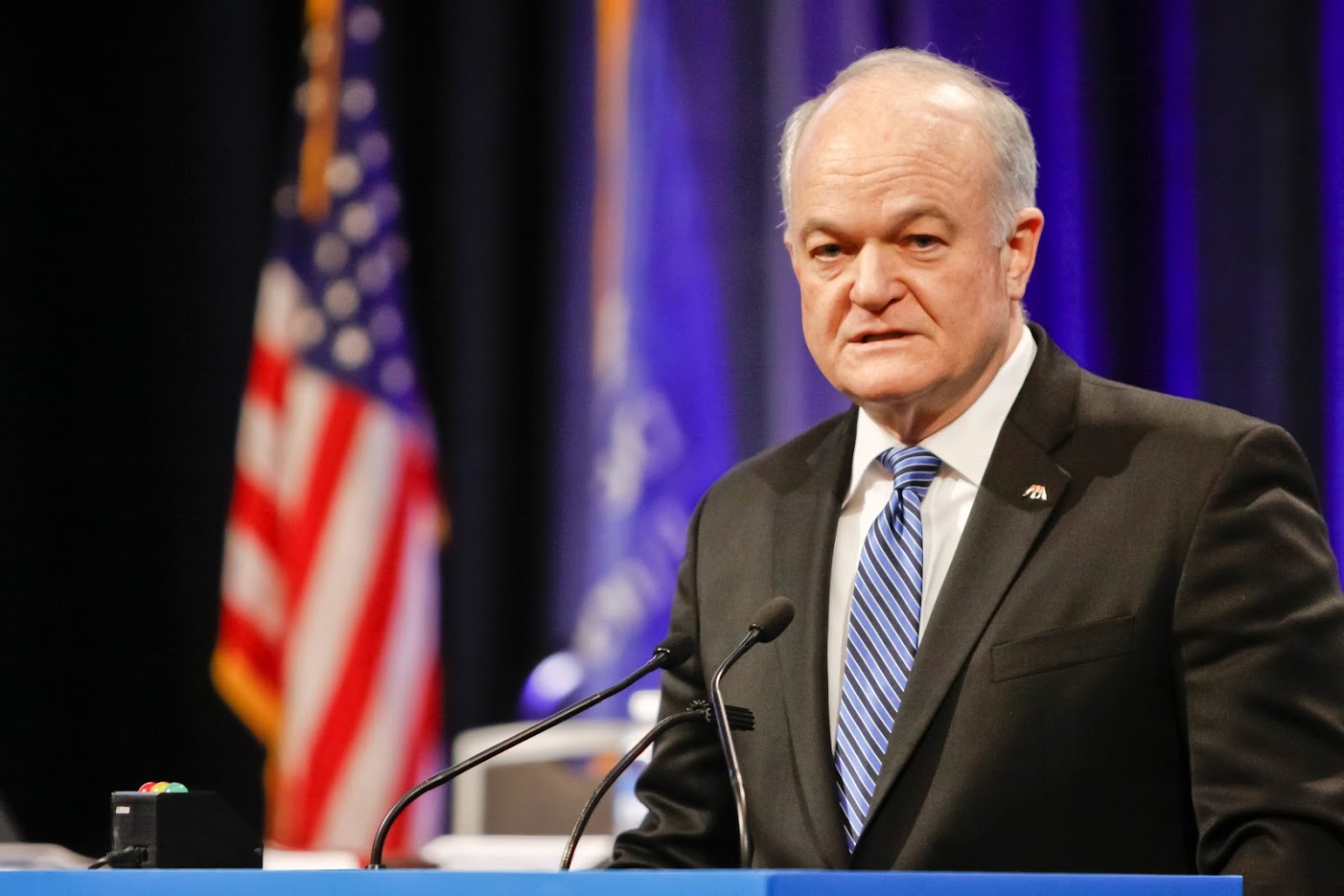ABA executive director urges increased efforts to reverse decline in paid membership

ABA Executive Director Jack Rives. Photo by The Canadian Press Images/Michael Desjardins.
Updated: ABA Executive Director Jack Rives called on ABA leadership Monday to take action to increase lawyer members.
Quoting Dr. Martin Luther King Jr., ABA Executive Director Jack Rives told the ABA’s policymaking body that “this is no time to … take the tranquilizing drug of gradualism,”and called on ABA leadership to take action to increase lawyer members.
Rives’ call to action on a new membership model came at Monday’s ABA House of Delegates meeting after a stark presentation of the ABA’s continuous market share decline.
Forty years ago, 50 percent of the lawyers in the United States were members of the ABA. The ABA currently has a 22 percent market share.
Speaking at the ABA Midyear Meeting in Vancouver, British Columbia, Rives said the ABA’s membership currently stands at 412,499 members, 70 percent of whom are lawyers. Another 26 percent are students and 4 percent including paralegals and international lawyers—are associates.
To reverse the decline, ABA leadership, staff and marketing consultants are working on a new membership model that is on a trajectory to be presented to the House of Delegates during their annual meeting this August in Chicago.
In the current version of the new membership model, there is a focus on bundling benefits and significantly simplifying ABA dues categories. Rives noted there are currently 157 dues categories at the ABA, depending on the types of work members do, their length of service and other considerations.
The model would reduce the dues categories down to three. Bundled benefits would include two sections, access to a CLE library and access to content that will be organized behind a member-only paywall.
Rives said the changes, which will require an investment in products and resources, are necessary in order for the ABA to remain a robust professional association and maintain its status as the voice of the legal profession.
A later presentation by ABA Treasurer Michelle A. Behnke put a finer point on the membership decline, which has resulted in significant revenue losses for the organization. Even with deep cuts in the past year, the ABA’s operating deficit was $7.7 million for fiscal year 2017.
While the ABA’s investments put the association in the black for the year, Behnke said such a strong performance shouldn’t be relied upon. A more telling moment came when she showed delegates the association’s operating budget decline over the past five years and a projection for FY19. In that time period, the ABA’s operating budget has decreased from $116 million in 2014, to $96.1 million for FY18. Behnke is projecting the need to further decrease the budget by more than $5 million for FY19 to $90.8 million.
Behnke agrees with the adage that you can’t cut your way to a healthy organization. But she cautioned that the organization also can’t ignore the reality of the expense and revenue picture.
And while she praised the work of the ABA throughout the U.S. and the globe, Behnke said the revenue decline must reverse in order for the ABA to be able to conduct its mission work.
“No money, no mission,” she told delegates. “We’ve got to pay attention to our finances and take some bold steps to reverse our dues decrease so that we will be able to defend liberty and pursue justice.”
ABA President Hilarie Bass urged House leadership to make tough decisions when they are asked to do so, likely at the ABA’s Annual Meeting in Chicago when the association celebrates its 140th anniversary.
During her travels throughout the U.S. and around the world in her first six months in office, Bass said she’s become aware of the power of the ABA to influence and effect change. She’s also been made keenly aware that the ABA’s “power can only be as strong as our organization itself.”
Bass said the House, which sets policy for the ABA, needs to “recognize that the association needs to evolve and adapt to the changing needs of the profession and its lawyers.”
“Whether that means modifications to our dues structure, our section structure or our administrative structure, we cannot stand idly by and expect that our association will continue to thrive and grow utilizing the same framework of operations that have been in place for decades,” she said.
When delegates are presented with proposed changes, Bass urged them not to nitpick and take the recommendations personally.
“No one likes change. But as servant leaders, we must listen to the needs of our members and non-members.”
And she implored, the changes must be made in order for the association to maintain the power to do its work.
“We must all commit in advance to remind ourselves that everyone involved in this process is moving forward in good faith with one goal in mind, to insure that our association is here in another 140 years to continue its great work.”
See the full address to the house here:
Follow along with our full coverage of the 2018 ABA Midyear Meeting
Updated on Feb. 8 to add comments from Hilarie Bass and Michelle A. Behnke; updated figures in ninth paragraph at 3:18 p.m. on Feb. 8



